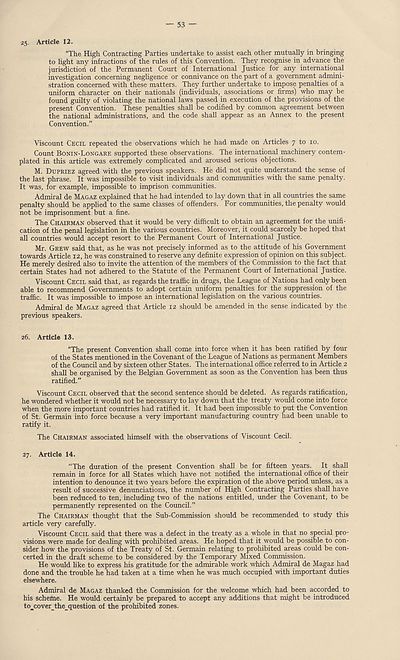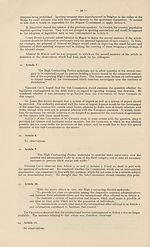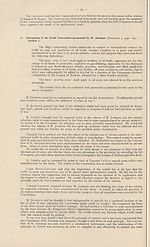Armament > Conference for the control of the international trade in arms, munitions and implements of war
(55)
Download files
Complete book:
Individual page:
Thumbnail gallery: Grid view | List view

53 —
25- Article 12.
“The High Contracting Parties undertake to assist each other mutually in bringing
to light any infractions of the rules of this Convention. They recognise in advance the
jurisdiction of the Permanent Court of International Justice for any international
investigation concerning negligence or connivance on the part of a government admini¬
stration concerned with these matters. They further undertake to impose penalties of a
uniform character on their nationals (individuals, associations or firms) who may be
found guilty of violating the national laws passed in execution of the provisions of the
present Convention. These penalties shall be codified by common agreement between
the national administrations, and the code shall appear as an Annex to the present
Convention.”
Viscount Cecil repeated the observations which he had made on Articles 7 to 10.
Count Bonin-Longare supported these observations. The international machinery contem¬
plated in this article was extremely complicated and aroused serious objections.
M. Dupriez agreed with the previous speakers. He did not quite understand the sense of
the last phrase. It was impossible to visit individuals and communities with the same penalty.
It was, for example, impossible to imprison communities.
Admiral de Magaz explained that he had intended to lay down that in all countries the same
penalty should be applied to the same classes of offenders. For communities, the penalty would
not be imprisonment but a fine.
The Chairman observed that it would be very difficult to obtain an agreement for the unifi¬
cation of the penal legislation in the various countries. Moreover, it could scarcely be hoped that
all countries would accept resort to the Permanent Court of International Justice.
Mr. Grew said that, as he was not precisely informed as to the attitude of his Government
towards Article 12, he was constrained to reserve any definite expression of opinion on this subject.
He merely desired also to invite the attention of the members of the Commission to the fact that
certain States had not adhered to the Statute of the Permanent Court of International Justice.
Viscount Cecil said that, as regards the traffic in drugs, the League of Nations had only been
able to recommend Governments to adopt certain uniform penalties for the suppression of the
traffic. It was impossible to impose an international legislation on the various countries.
Admiral de Magaz agreed that Article 12 should be amended in the sense indicated by the
previous speakers.
26. Article 13.
“The present Convention shall come into force when it has been ratified by four
of the States mentioned in the Covenant of the League of Nations as permanent Members
of the Council and by sixteen other States. The international office referred to in Article 2
shall be oreranised by the Belgian Government as soon as the Convention has been thus
ratified.”
Viscount Cecil observed that the second sentence should be deleted. As regards ratification,
he wondered whether it would not be necessary to lay down that the treaty would come into force
when the more important countries had ratified it. It had been impossible to put the Convention
of St. Germain into force because a very important manufacturing country had been unable to
ratify it.
The Chairman associated himself with the observations of Viscount Cecil.
27. Article 14.
"The duration of the present Convention shall be for fifteen years. It shall
remain in force for all States which have not notified the international office of their
intention to denounce it two years before the expiration of the above period unless, as a
result of successive denunciations, the number of High Contracting Parties shall have
been reduced to ten, including two of the nations entitled, under the Covenant, to be
permanently represented on the Council.”
The Chairman thought that the Sub-Commission should be recommended to study this
article very carefully.
Viscount Cecil said that there was a defect in the treaty as a whole in that no special pro¬
visions were made for dealing with prohibited areas. He hoped that it would be possible to con¬
sider how the provisions of the Treaty of St. Germain relating to prohibited areas could be con¬
certed in the draft scheme to be considered by the Temporary Mixed Commission.
He would like to express his gratitude for the admirable work which Admiral de Magaz had
done and the trouble he had taken at a time when he was much occupied with important duties
elsewhere.
Admiral de Magaz thanked the Commission for the welcome which had been accorded to
his scheme. He would certainly be prepared to accept any additions that might be introduced
to^cover the question of the prohibited zones.
25- Article 12.
“The High Contracting Parties undertake to assist each other mutually in bringing
to light any infractions of the rules of this Convention. They recognise in advance the
jurisdiction of the Permanent Court of International Justice for any international
investigation concerning negligence or connivance on the part of a government admini¬
stration concerned with these matters. They further undertake to impose penalties of a
uniform character on their nationals (individuals, associations or firms) who may be
found guilty of violating the national laws passed in execution of the provisions of the
present Convention. These penalties shall be codified by common agreement between
the national administrations, and the code shall appear as an Annex to the present
Convention.”
Viscount Cecil repeated the observations which he had made on Articles 7 to 10.
Count Bonin-Longare supported these observations. The international machinery contem¬
plated in this article was extremely complicated and aroused serious objections.
M. Dupriez agreed with the previous speakers. He did not quite understand the sense of
the last phrase. It was impossible to visit individuals and communities with the same penalty.
It was, for example, impossible to imprison communities.
Admiral de Magaz explained that he had intended to lay down that in all countries the same
penalty should be applied to the same classes of offenders. For communities, the penalty would
not be imprisonment but a fine.
The Chairman observed that it would be very difficult to obtain an agreement for the unifi¬
cation of the penal legislation in the various countries. Moreover, it could scarcely be hoped that
all countries would accept resort to the Permanent Court of International Justice.
Mr. Grew said that, as he was not precisely informed as to the attitude of his Government
towards Article 12, he was constrained to reserve any definite expression of opinion on this subject.
He merely desired also to invite the attention of the members of the Commission to the fact that
certain States had not adhered to the Statute of the Permanent Court of International Justice.
Viscount Cecil said that, as regards the traffic in drugs, the League of Nations had only been
able to recommend Governments to adopt certain uniform penalties for the suppression of the
traffic. It was impossible to impose an international legislation on the various countries.
Admiral de Magaz agreed that Article 12 should be amended in the sense indicated by the
previous speakers.
26. Article 13.
“The present Convention shall come into force when it has been ratified by four
of the States mentioned in the Covenant of the League of Nations as permanent Members
of the Council and by sixteen other States. The international office referred to in Article 2
shall be oreranised by the Belgian Government as soon as the Convention has been thus
ratified.”
Viscount Cecil observed that the second sentence should be deleted. As regards ratification,
he wondered whether it would not be necessary to lay down that the treaty would come into force
when the more important countries had ratified it. It had been impossible to put the Convention
of St. Germain into force because a very important manufacturing country had been unable to
ratify it.
The Chairman associated himself with the observations of Viscount Cecil.
27. Article 14.
"The duration of the present Convention shall be for fifteen years. It shall
remain in force for all States which have not notified the international office of their
intention to denounce it two years before the expiration of the above period unless, as a
result of successive denunciations, the number of High Contracting Parties shall have
been reduced to ten, including two of the nations entitled, under the Covenant, to be
permanently represented on the Council.”
The Chairman thought that the Sub-Commission should be recommended to study this
article very carefully.
Viscount Cecil said that there was a defect in the treaty as a whole in that no special pro¬
visions were made for dealing with prohibited areas. He hoped that it would be possible to con¬
sider how the provisions of the Treaty of St. Germain relating to prohibited areas could be con¬
certed in the draft scheme to be considered by the Temporary Mixed Commission.
He would like to express his gratitude for the admirable work which Admiral de Magaz had
done and the trouble he had taken at a time when he was much occupied with important duties
elsewhere.
Admiral de Magaz thanked the Commission for the welcome which had been accorded to
his scheme. He would certainly be prepared to accept any additions that might be introduced
to^cover the question of the prohibited zones.
Set display mode to:
![]() Universal Viewer |
Universal Viewer | ![]() Mirador |
Large image | Transcription
Mirador |
Large image | Transcription
Images and transcriptions on this page, including medium image downloads, may be used under the Creative Commons Attribution 4.0 International Licence unless otherwise stated. ![]()
| League of Nations > Armament > Conference for the control of the international trade in arms, munitions and implements of war > (55) |
|---|
| Permanent URL | https://digital.nls.uk/195382478 |
|---|
| Shelfmark | LN.IX |
|---|
| Description | Over 1,200 documents from the non-political organs of the League of Nations that dealt with health, disarmament, economic and financial matters for the duration of the League (1919-1945). Also online are statistical bulletins, essential facts, and an overview of the League by the first Secretary General, Sir Eric Drummond. These items are part of the Official Publications collection at the National Library of Scotland. |
|---|---|
| Additional NLS resources: |
|

